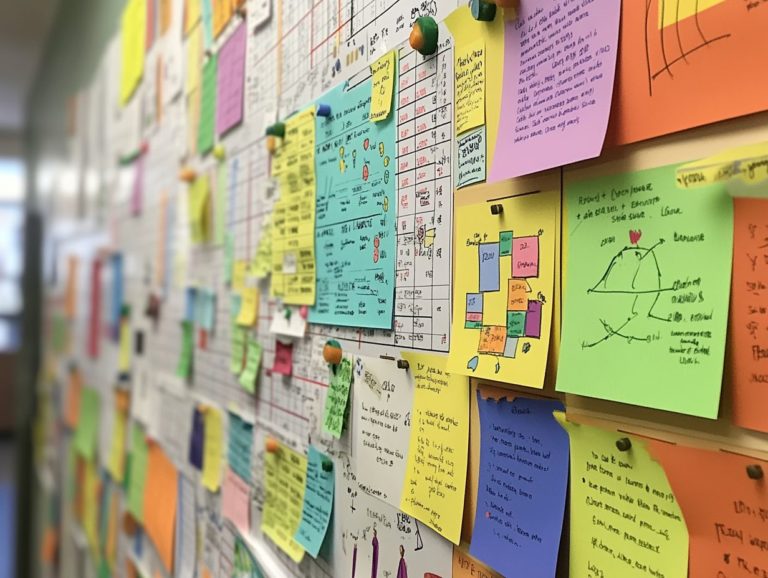FAQs on Balancing Priorities
In today s fast-paced world, grasping and balancing your priorities is crucial. This article delves into the essence of priorities, highlighting their significance and guiding you in identifying what truly matters in your life.
You ll explore practical methods for determining your priorities, effective strategies for managing multiple demands, and common challenges that may arise along the way. Discover the benefits of maintaining a balanced approach, which can significantly enhance your productivity and overall well-being.
Let s take charge of your priorities right now! It s time to dive in!
Contents
Key Takeaways:

- Defining priorities allows you to focus on what matters most and achieve your goals effectively.
- Identifying your priorities helps you allocate your time and resources efficiently.
- Balancing priorities through strategies like time management and delegation leads to increased productivity and well-being.
Understanding Priorities
Understanding your priorities is key to personal and professional success. It influences your time management and how you handle your workload.
By honing your prioritization skills, you can evaluate tasks and balance your responsibilities. This ensures that your daily priorities align seamlessly with your overarching goals.
You can leverage various project management tools and effective prioritization methods to navigate shifting circumstances. This ultimately enhances collaboration and communication within your team.
Defining Priorities and Their Importance
Defining your priorities involves understanding their significance in achieving both your personal and professional goals. This enables you to concentrate on what truly matters.
It s crucial to recognize the difference between urgent tasks and those that genuinely hold importance. By assessing and setting your priorities, you can align your daily actions with your core values and intentions.
This practice boosts your productivity and cultivates a deeper sense of fulfillment. You consciously decide where to invest your time and energy, leading to more meaningful outcomes.
Effective workload management springs from this prioritization, allowing you to navigate responsibilities with ease while maintaining a healthy work-life balance.
Identifying Your Priorities
Identifying your priorities demands a nuanced understanding of what is both urgent and important. It involves evaluating tasks with discernment and adapting to the ever-evolving landscape around you.
By honing this skill, you position yourself to make informed decisions that genuinely reflect your objectives.
Methods for Determining Priorities

You have numerous methods at your disposal for determining priorities. These can significantly enhance your productivity and streamline your decision-making process.
By employing techniques like the Eisenhower Matrix, you can easily distinguish between what s urgent and what s important. This paves the way for a more strategic approach to managing your time.
The ABC prioritization method provides a clear framework to sort your responsibilities based on their significance. This allows you to focus on what truly matters.
Additionally, productivity strategies like the Pomodoro Technique help maintain motivation while reducing burnout. This ensures you meet both your short-term and long-term goals efficiently.
Embracing these approaches can transform how you tackle daily challenges, fostering a profound sense of accomplishment and purpose.
Balancing Priorities
Balancing your priorities is crucial for sustaining productivity and minimizing stress. It requires managing your workload efficiently, and you can learn more about this by finding balance in goal prioritization while ensuring that project deadlines are met.
Adapting to evolving circumstances is vital for maintaining this balance.
Strategies for Managing Multiple Priorities
Implementing effective strategies for managing multiple priorities requires you to prioritize tasks, refine your organization skills, and remain flexible in the face of changing circumstances.
By leveraging techniques like the Eisenhower Matrix a tool that helps you prioritize tasks based on urgency and importance you can clearly differentiate between urgent and important tasks. This ensures your focus is directed precisely where it s needed most.
Embracing digital tools, such as project management software, can streamline your workflows, making it easier to track deadlines and responsibilities.
Carve out specific time blocks for focused work and enjoy the clarity it brings! Leave some gaps in your schedule to accommodate unexpected demands.
Regularly reviewing your tasks helps maintain clarity and allows you to adjust your priorities as needed. This ensures you stay adaptable and productive amidst the swirling chaos of daily responsibilities.
Common Challenges in Balancing Priorities
You may often encounter common challenges when trying to balance priorities. These challenges often stem from unforeseen obstacles, looming deadlines, and the necessity of effective stress management.
These factors can complicate your evaluation of tasks, making it essential to navigate them with a smart plan.
Obstacles and How to Overcome Them

Overcoming obstacles in balancing your priorities requires a keen understanding of the root causes and the application of effective prioritization techniques to adapt to new challenges.
One significant barrier you may encounter is the tendency to feel overwhelmed by competing demands, which can easily lead to stress and burnout.
To combat this, utilize strategies like the Matrix. Embracing a mindset of flexibility allows you to reevaluate tasks as circumstances evolve.
Regularly scheduling time for self-reflection can also be invaluable. It helps you assess which responsibilities genuinely align with your personal goals, making it easier to allocate your time and energy where they will have the most impact.
By cultivating these adaptable habits, you enhance your ability to navigate the complexities of your commitments with grace and efficacy.
Benefits of Balancing Priorities
Balancing your priorities unlocks powerful benefits that can transform your life! You ll find an enhancement in your overall well-being, sharpened organizational skills, and a clearer trajectory toward reaching both your personal and professional goals.
Impact on Productivity and Well-being
The impact of balancing your priorities on productivity and well-being is truly profound. It directly shapes your ability to manage stress and achieve both personal and professional goals.
When you effectively prioritize your tasks, you streamline your workflow and cultivate a sense of control over your responsibilities. This mastery over your time enables you to allocate energy not just to work projects, but also to your personal well-being, fostering a harmonious equilibrium in your life.
As your priorities shift and evolve, being adaptable can significantly lessen your stress levels. This provides you with clearer focus and enhanced performance.
Finding that sweet spot often leads to increased motivation, making it more likely that you ll reach your desired milestones.
Ultimately, this intricate relationship between prioritization, productivity, and stress management plays a crucial role in fulfilling your aspirations across various aspects of life.
Frequently Asked Questions
What does it mean to balance priorities?

Balancing priorities means managing your time and resources wisely between different tasks, responsibilities, and goals, including FAQs on balancing work and life.
Why is balancing priorities important?
Balancing priorities is important because it allows you to be more productive, organized, and efficient in achieving your goals. It also helps you avoid feeling overwhelmed and burnt out.
How do I determine my priorities?
To determine your priorities, identify what tasks or goals are most important and urgent. Tools like a to-do list or a priority matrix can help you focus on what matters most.
What are some strategies for balancing priorities?
Balance your priorities by ranking tasks based on their importance and urgency. Set realistic goals, delegate when necessary, and practice effective time management.
How can I balance my work and personal priorities?
Balancing work and personal priorities starts with setting clear boundaries. Make time for both work and personal tasks, and don t hesitate to communicate your limits with others.
What should I do if I feel overwhelmed with balancing priorities?
If you feel overwhelmed, take a moment to reassess your goals. Consider delegating tasks or asking for help. Remember to prioritize self-care it s essential to avoid burnout!






